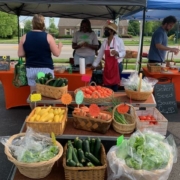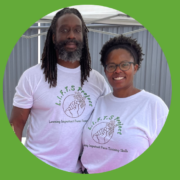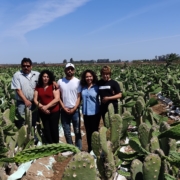Donetta Boykin
Donnetta Boykin, owner and operator of Endigo’s Herbals & Organics, started her farming career as a gardener in Trotter, Ohio, a small city just outside of Dayton, in 2003. After her son’s school called to report his behavior, she would then ask, “what are you all feeding him for breakfast?” She would then discover that they were serving him foods with high sugar content, which was not allowed in her home. She began to tailor to his diet by feeding him a healthy breakfast at home and packing lunch daily. As she observed the situation with her son, she began to research kids’ nutritional needs. She explained that she was not comfortable with the things she observed in her son’s school lunch program and that there needed to be a program put into place to provide students with better, healthier, and better-quality foods. After making several observations and doing research, Donnetta wanted to transition her small-scale garden into a commercial farm as a step in developing a farm to school program for local public schools. She also compared the public school’s cafeteria to the local private school cafeteria, which further propelled her into farming on a larger scale. Donnetta began reaching out to organizations for assistance in scaling up to a commercial farm. Being a Black woman deterred organizations from helping her, she said.
Though organizations were prejudiced against Donnetta when she began seeking help, she was eventually able to access resources for her farm vision. She was recently certified through Central State University’s incubator program, which she achieved in one year, and she co-manages a 1.5-acre farm through that same program. She is also a co-manager of a four-acre farm for Homefull, a nonprofit organization in Dayton. Adjacent to the positions she fills with outside organizations is the management of her personal half-acre farm. She is currently growing squash, zucchini, collard and mustard greens, kale, lettuce blends, tomatoes, cucumbers, spinach, arugula, sweet potatoes, callaloo, peppers, okra, eggplant, mushrooms and a variety of heirloom vegetables. She also grows a variety of herbs, such as basil, rosemary, oregano, and chives. Endigo’s Herbals & Organics does not use pesticides or other chemicals, Donnetta said, because she has always wanted to farm organically. She also uses companion planting and flowers as natural pest deterrents to bring a healthy balance of repelling pests and incorporating pollinators.
Two of Donnetta’s greatest challenges in early farming were funding and networking. She stated that being able to sell produce in local farmers markets was a task and accessing funds such as grants to afford materials and tools was very difficult. “USDA grants are so hard to apply for,” she said, “and there is only so much you can invest into the process initially without neglecting other duties, such as supporting your family.” Donnetta had a breakthrough in networking when she discovered a listening session for CSU’s incubator program. In the small city of Trotwood, more than 60 people showed up to the listening session where Donnetta would discover that CSU was only accepting eight applicants for the incubator program. She considers herself lucky and blessed to have been selected because the competition was high. Her inspiration to become co-manager of the incubator farm comes from wanting to see the program succeed. Donnetta has been able to connect with several other organizations and people through the incubator program, one of which is the Ohio Ecological Food and Farm Association, which asked her to be a facilitator for a listening session for the Farm Bill.
Donnetta wishes that in her earlier years of farming, she had more access to modern technology. She says that African American farmers are so used to traditional farming, but it is labor-intensive and being able to adapt modern farm practices could save time. Her commitment to bettering her own and others’ farming experience/life goes beyond her networking. She hopes to begin a Facebook group for local farmers to share and learn to broaden their farming practices. Donnetta gives Central State University’s Extension program major credit for providing knowledge and allowing her the opportunity to grow and build her farm and leadership. She wishes there were avenues for getting information specifically to BIPOC farmers and says that farmers are missing opportunities because that information reaches POC farming communities too late. She is a part of a farmers markets in Trotwood and Dayton (where there are food desserts) and can give WIC and senior food vouchers to those that qualify based on income and age. She is also starting a community outreach program to 4-H and a local daycare center where she will be able to teach children how to grow food. She has a volunteer program called “time banking,” where the hours volunteered on the farm are converted to dollars that volunteers can use to purchase fresh produce.
Donetta said that being able to acquire farmland is what will define her success as a farmer. She wants to run her business, share, and allow nature to be on her land. She would also like to provide housing for interns and provide individuals the space to connect with land as a form of therapy. Lastly, she would like to donate to local organizations that are facing economic challenges. She has learned that land and funding access are the two major barriers to successful farming in her community. Land ownership and heir properties are not accessed due to lack of funding, she said, and that there should be more grant writers in the communities to help people access resources.








![thumbnail_ed-hunt[1] Ed Hunt](https://attra.ncat.org/wp-content/uploads/2022/08/thumbnail_ed-hunt1-180x180.jpg)



